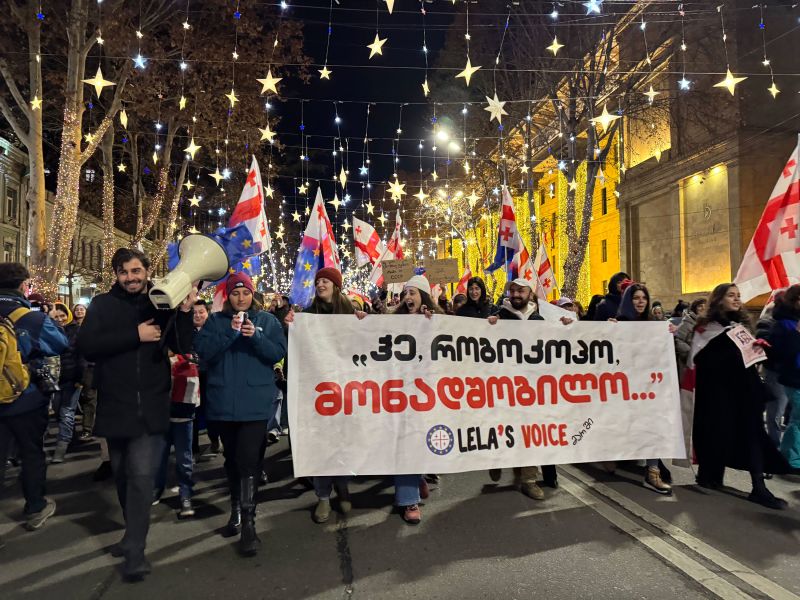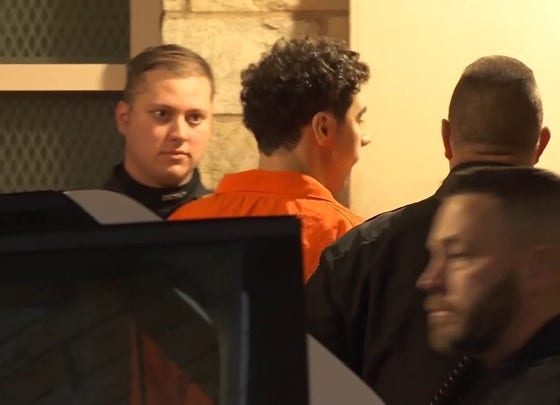If a space alien landed on Rustaveli Avenue, the elegant main street of the Georgian capital Tbilisi, they might think it’s a party. Crowds of people surge down the street, traffic blocked by police, many wearing the red and white Georgian flag, or the European Union’s blue flag with a circle of 12 twelve golden stars, like capes.
Every few minutes another group marches by, clutching banners and flags, beating drums, blowing whistles and chanting slogans. There are the “Sportsmen against Violence” (they mean government security force violence); or college students holding a sign “Liberte, Egalite, Fraternite,” and chanting “Sakartvelo!” (the name for Georgia in the Georgian language); or young people with a large white banner challenging the riot police: “Hey, robocop, you are born to be a slave.”
It’s Saturday night, but amidst the boisterous atmosphere, Georgians who have participated in nightly protests for the past month are exhausted, and unsure what tomorrow will bring.
Sunday, at 11 a.m. local time, the parliament, now controlled by the ruling Georgian Dream party, will inaugurate a new president, Mikheil Kavelashvili, a goateed 53-year-old former professional soccer player, founder of the ultra-right People’s Power party. He was chosen December 14 by the parliament that was elected in late October, a vote in which international observers noted numerous irregularities and government pressure on voters.
But what really ignited recent protests was the November announcement by Prime Minister Irakli Kobakhidze that he was suspending Georgia’s EU membership application process until the end of 2028. Polls show that 80% of Georgians support membership in the EU, and protesters turned out en masse for nightly marches and rallies.
At the curb along Rustaveli Avenue supporters set up coffee stands and ladle out soup to the cold and hungry. On one corner, a guitarist blasts Jimmy Hendrix chords. On another, a jazz singer croons softly. The walls of almost every building along the street are covered with graffiti, almost all of it pro-European Union and anti-Russian. There was so much of it the government sent crews into the streets to cover it up with black spray paint, a menacing reminder of the violence that black-clad and masked security forces have unleashed against scores of protesters.
Friday night, a thunder bolt of news: the United States was sanctioning the founder of the Georgian Dream party, now its honorary chairman, Bidzina Ivanishvili, a multi-billionaire, the richest man in Georgia, an oligarch who allegedly controls the country from behind the scenes.
“Ivanishvili and Georgian Dream’s actions have eroded democratic institutions, enabled human rights abuses, and curbed the exercise of fundamental freedoms in Georgia,” US Secretary of State Antony Blinken said.
“Furthermore, they have derailed Georgia’s Euro-Atlantic future, a future the Georgian people overwhelmingly desire and the Georgian constitution mandates.”
On Rustaveli Avenue, in front of the Parliament building, the cheering crowd played the national anthem of the United States, along with the Georgian national anthem.
A 10-minute walk from the Parliament building stands the pristine white 19th century Orbeliani Palace, the official residence of the president of Georgia. The current president, up until Sunday at least, is the 72-year-old, French-born Salome Zourabichvili. She insists she is the only legitimate president and derides the Georgian Dream’s hand-picked selection of Kavelashvili as an anti-constitutional “farce.”
Legally, the president’s powers are limited, but Zourabichvili has succeeded in an unmanageable task: bringing the country’s fractious political parties together in a coalition. Whether they will remain united is unknown.
Also unknown is what Zourabichvili will do Sunday morning. Late Saturday night she issued a statement: “Greetings, I greet you from the Orbeliani Palace. I am here, I will stay here, and I will spend the night here. Tomorrow, at 10 a.m., I will be waiting for you at the Orbeliani Palace. From here, I will share what tomorrow will bring, what the days ahead will look like, and what the days of victory will hold.”
Will she remain in the presidential palace and risk arrest, as the Georgian Dream prime minister threatened? Will she leave the palace and remain the symbol of resistance? What will the protesters do? Will the movement ignite? Or fizzle?
As I talk with protesters in the streets, several tell me this is a unique moment. President Zourabichvili, they say, is the symbolic head of their movement, but there is no true “leader.”
Even the protests seem not to be led by any one person. They are home-grown, with groups of friends, colleagues or like-minded people joining together almost spontaneously. They are united, they say, by a cause: joining the European Union. Georgia, they say, is part of Europe. For two centuries Russia, and the Soviet Union, tried to control their country. But Georgia remains Georgia, they say, with its own language and proud traditions.


